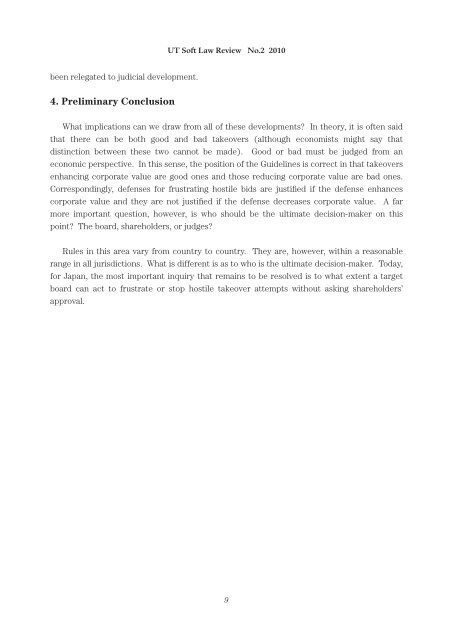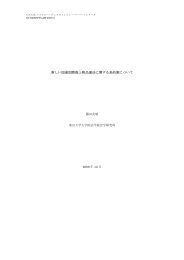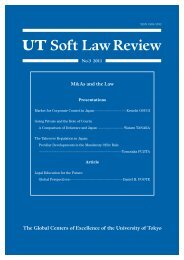<strong>UT</strong> <strong>Soft</strong> <strong>Law</strong> <strong>Review</strong> No.2 2010been relegated to judicial development.4. Preliminary ConclusionWhat implications can we draw from all of these developments? In theory, it is often saidthat there can be both good and bad takeovers (although economists might say thatdistinction between these two cannot be made). Good or bad must be judged from aneconomic perspective. In this sense, the position of the Guidelines is correct in that takeoversenhancing corporate value are good ones and those reducing corporate value are bad ones.Correspondingly, defenses for frustrating hostile bids are justified if the defense enhancescorporate value and they are not justified if the defense decreases corporate value. A farmore important question, however, is who should be the ultimate decision-maker on thispoint? The board, shareholders, or judges?Rules in this area vary from country to country. They are, however, within a reasonablerange in all jurisdictions. What is different is as to who is the ultimate decision-maker. Today,for Japan, the most important inquiry that remains to be resolved is to what extent a targetboard can act to frustrate or stop hostile takeover attempts without asking shareholders’approval.9
<strong>UT</strong> <strong>Soft</strong> <strong>Law</strong> <strong>Review</strong> No.2 2010Developing an Infrastructure for Hostile Takeovers:The Delaware ExperienceJack B. JACOBS *I. INTRODUCTIONIn 2005, I was honored to be invited to Tokyo to address a group of highly sophisticatedJapanese academics, lawyers and businesspersons about Delaware’s experience in creatingrules governing the proper response of corporate directors to hostile takeover bids. Whatoccasioned the invitation was that six months earlier, a distinguished group of expert businessand legal representatives, called the “Corporate Value Study Group,” authored the TakeoverGuidelines for Protecting and Enhancing Corporate Value and the Interests ofShareholders As A Whole (“Guidelines”). 1 Before then, Japan had no existing legal rules orinfrastructure for regulating board responses to hostile bids. The Guidelines, which werepromulgated in May, 2005 by the Japanese Ministry of Economy, Trade and Industry (“METI”)and the Japanese Ministry of Justice (“MOJ”), were intended to supply those rules, with theenforcement infrastructure being the Japanese courts.The Guidelines adopted the Corporate Value Study Group’s (“CVSG”) recommendationsthat in responding to hostile takeover bids, boards of Japanese companies should be guidedby certain principles derived largely from judge-made Delaware fiduciary law. Significantly,however, the Guidelines themselves were not “hard law;” that is, they were not formallegislation or administrative regulations. Rather, they were more akin to nonbindingadmonitory principles that implicitly, yet consistent with the Delaware model, appeared tocontemplate binding enforcement by the Japanese courts in specific cases. The judicialenforcement would take place within a legislative and administrative rulemaking framework* Justice of the Delaware Supreme Court1 japanese ministry of econ., trade and indus., ministry of justice, “takeoverguidelines for protecting and enhancing corporate value and the interests ofshareholders as a whole 3 (May 27, 2005), available at http://www.meti.go.jp/policy/economicorganization/pdf/shishin_hontai.pdf. The Guidelines implemented recommendations contained ina voluminous report, (“the Corporate Value Report”) also authored by The Corporate Value Study Group,which in turn was the product of a nine month investigation, conducted by the Corporate Value StudyGroup, into United States and European anti-takeover precedents and defense techniques. corporatevalue study group, corporate value report 5 (April 27, 2005), available at http://www.meti.go.jp/policy/economic_organization/pdf/houkokusyo_hontai_eng.pdf.10





